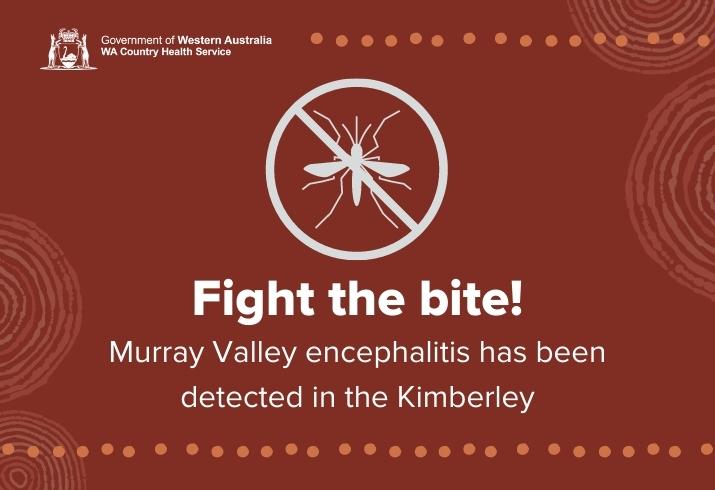Murray Valley encephalitis warning for Kimberley Region

Residents and travellers in the Kimberley region are being urged to take extra precautions to avoid mosquito bites after Murray Valley encephalitis (MVE) was reported in an individual residing in the West Kimberley.
Department of Health Acting Managing Scientist, Craig Brockway, said this was the first human case of MVE reported in Western Australia since 2018. The patient is now recovering.
"Murray Valley encephalitis virus is carried by mosquitoes, and while the risk of being infected and becoming unwell is low, the illness caused by the virus can be severe or even fatal," he said.
The virus has also been detected in sentinel chicken flocks at locations throughout the Kimberley region this year, most recently in June, indicating that the virus is active within the environment. The chickens are part of an early warning program for activity of MVE virus undertaken by the Department of Health, PathWest and local governments.
"The human case and the recent sentinel chicken detections indicate that environmental conditions, although currently cool and dry, continue to support the transmission of MVE virus throughout the Kimberley," Mr Brockway said.
"Residents and visitors in the region, especially individuals heading out fishing and camping, should take precautions to avoid being bitten by mosquitoes."
Initial symptoms of MVE include fever, drowsiness, headache, stiff neck, nausea and dizziness. People experiencing these symptoms should seek medical advice immediately. In severe cases, people may experience fits, lapse into a coma, and may be left with permanent brain damage or die.
In young children, fever might be the only early sign, so parents should urgently seek medical advice if concerned, particularly if their child experiences drowsiness, floppiness, irritability, poor feeding, or general distress.
"There is no vaccine or specific treatment for MVE. The only way to prevent infection is to avoid being bitten by mosquitoes," Mr Brockway said.
It is currently peak tourist season in the Kimberley. Many people travelling to the region will be unaware of the risks associated with mosquitoes. While there is no need to change your travel plans, it is important to pack appropriately and practice good mosquito avoidance practices while you are away.
"If you are thinking of travelling north to escape the cold weather, make sure you take an effective repellent and long-sleeved clothing to protect the whole family."
Mr Brockway said residents and travellers in the Kimberley region can avoid mosquito bites by taking these few simple steps:
- avoid outdoor exposure around dawn and early evening when the mosquitoes that transmit MVE virus are most active
- wear protective (long, loose-fitting, light-coloured) clothing when outdoors
- apply a personal insect repellent containing diethyltoluamide (DEET), picaridin or p-menthane-3,8-diol (PMD), also known as oil of lemon eucalyptus (OLE), evenly to all areas of exposed skin
- use mosquito coils and mosquito lanterns and apply barrier sprays containing bifenthrin in patio and outdoor areas around houses
- ensure insect screens are installed and in good condition on houses and caravans
- use mosquito nets and mosquito-proof tents when camping
- ensure infants and children are adequately protected against mosquito bites, preferably with suitable clothing, bed nets or other forms of insect screening.
For more information on how to prevent mosquito bites visit HealthyWA.

